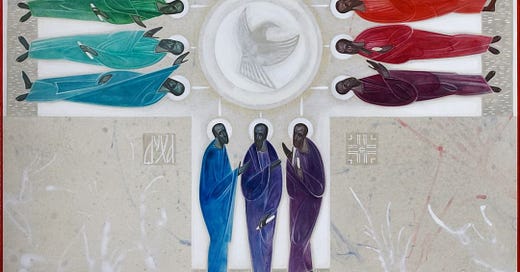Don’t forget, you can join us tonight at 7:00 EST for our third installment of Adventures in Barth: The Barmen Declaration:
You can join us (fingers-crossed) live with this link.
Recently, several bouts of night sweats caused me to fret that the cancer latent in my marrow had flared up once again. Such was the reason I sat on the butcher paper exam table in my oncologist’s office last week, listening to him dish on statistics and treatment trends as he felt me up for lumps. He declared me clear and admonished me to monitor myself for further symptoms.
Still worried, I asked him, “Is there anything else I can do?”
He straightened his stethoscope, “Pray.”
Fifty days after he calls the crucified Christ from the tomb, the Holy Spirit descends upon the disciples Easter has left behind. The Holy Spirit is specifically the Spirit of Jesus. Like any other living person, Jesus has a spirit that identifies him. Living with death behind him, the Holy Spirit is the spirit of the Risen Jesus.
Pentecost highlights the danger of attempting to plot the being and work of a triune God onto a linear timeline exactly because Pentecost does not signal the arrival of a heretofore absent Spirit.
The Holy Spirit alighted on Mary, not only overshadowing her womb but eliciting the ecstatic speech we call the Magnificat. The Holy Spirit transferred the twelve from town to town and long before them the Spirit “spoke by the prophets.” At the very beginning of scripture— in the Beginning— the Spirit is the liveliness of God that broods and brings forth life. Just so, the Spirit is likewise the liveliness of each life and of life itself.
Thus, the Holy Spirit is not merely the Spirit of Jesus.
The Holy Spirit is one with the Father, Maker of Heaven and Earth.
Just so, the Holy Spirit who is the liveliness of all life is the actualizer of events in the world.
Neither history nor natural processes are realms where the Holy Spirit is ineffective.
The spontaneity of the latter and the unpredictability of the former are both due, as Robert Jenson puts it, “to the spiritedness of Jesus’s Spirit.” We tend to think of history and natural processes in terms of cause and effect determinism; such that, if we knew all the information we could possibly learn about the world then we would possess the power to predict the future. However, such a supposition is a denial of the rule of faith, particularly the third article of the creed. Nature’s spontaneity and history’s unpredictability just are the freedom of Jesus’s Spirit.
None of the events or the items of the world subsist apart from Jesus’s personality.
In every event and at any occasion, “we are,” as Jens says, “in someone’s intrusive presence.”
Keep reading with a 7-day free trial
Subscribe to Tamed Cynic to keep reading this post and get 7 days of free access to the full post archives.




